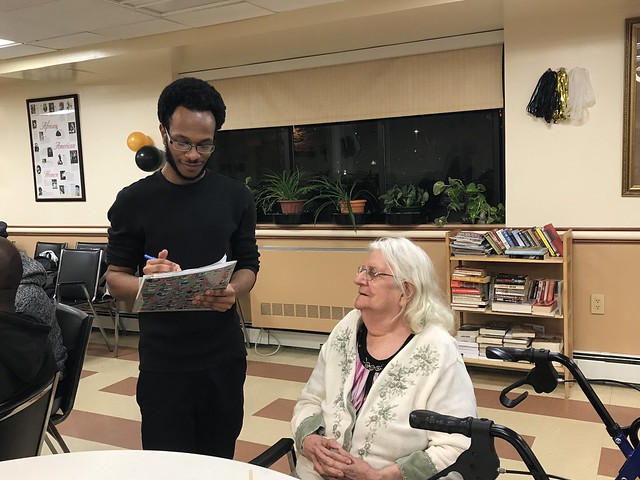
Finishing Strong
Public health students recently spent an evening with Hempstead senior citizens, sharing coffee, cake, and candid conversation about mortality and end-of-life issues.
Residents at the General MacArthur Senior Village community center rotated through several stations, where they learned how to set up a health care proxy and create ethical wills in which they can share their values and life lessons with family and friends.
They also played card games that explored ideas such as how they’d like to be remembered, and considered what they still wanted to accomplish in their lifetime. Yellow Post-it notes quickly covered the bucket-list board at Tanzim Bhuiya’s station:
Sky dive.
Be on a game show.
See the Northern Lights.
Meet Rihanna.
“Our goal is to remove the stigma of talking about death, while having good food and good conversation,” said Bhuiya ’18, who will pursue a Master of Public Health degree in the School of Health Sciences before beginning medical school at Hofstra in 2019. “This has shown me that health is not just about curing someone; it’s about talking to people and hearing what they have to say, their hopes and fears.”
Seniors need to be open to conversations about death and dying, said Regis Thompson, 73, adding that she has had many talks with her family about how she would like them to handle her passing.
“I want them to be prepared,” she said. “I don’t want to leave a hardship for them. Sure they will mourn and be sad, but they will have good memories of what I did and how I lived my life.”

“I wanted my students to know that they can connect with people and help them have better health outcomes.”
The evening was modeled after a popular international movement called Death Café; more than 5,000 similar events have been held in 52 countries. Public health professor Martine Hackett, PhD, was interested in organizing the event with the seniors at General MacArthur, part of the Village of Hempstead Housing Authority, when she learned that about twice as many blacks and Hispanics in Nassau County die prematurely (before age 75), compared with whites.
“I wanted my students to know that they can connect with people and help them have better health outcomes,” she said.
The Death Café was one of three team projects that students in her Introduction to Public Health class did with the Hempstead Housing Authority as part of the course’s service learning component.

Dr. Hackett says that several of the seniors who attended the Death Café have asked for more collaborative events with Hofstra students. Plans are in the works for another class to work with the Hempstead Housing Authority residents in the fall.
“This experience reminded me of the value of community and relationships in that many of the attendees shared that this was most social event they had all year, and ironically, it surrounded death,” said Tahirah Ellis, a first-year MPH student. She also holds a fulltime job as a community health coach with The Long Island Federally Qualified Health Centers, Inc., where she works with underserved, uninsured, and undocumented populations. “Over the past year, I have developed relationships within these communities, creating programming that increases their health literacy and reducing barriers that may impact their health status,” she said.
Guests who played the “My Gift of Grace” card game at Ellis’ table pondered questions such as: “If only one story were told at your memorial service, who should tell it?” and “Imagine you were lost at sea and your family had to pay for the search to find you. Who should make the decisions about how long to search for you?”
“They really enjoyed the conversation and declared it as being very meaningful and enlightening,” said Ellis. “The Death Café prompted me to have my own discussion on death with my family members and evaluate our preparedness for the end-of-life stage.”